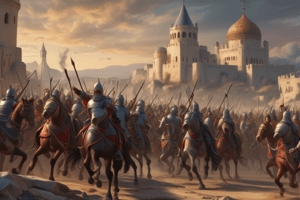Podcast
Questions and Answers
The Crusades represented a peaceful exchange of ideas between Europeans and Muslims.
The Crusades represented a peaceful exchange of ideas between Europeans and Muslims.
False (B)
By the end of World War I, Europeans had come to dominate over 95 percent of the Muslim world.
By the end of World War I, Europeans had come to dominate over 95 percent of the Muslim world.
True (A)
Muslims were commonly depicted as subhuman during the Crusades.
Muslims were commonly depicted as subhuman during the Crusades.
True (A)
The values of Judaism, Christianity, and Islam are fundamentally different from each other.
The values of Judaism, Christianity, and Islam are fundamentally different from each other.
Fear between Westerners and Muslims has lessened significantly over the centuries.
Fear between Westerners and Muslims has lessened significantly over the centuries.
Flashcards are hidden until you start studying
Study Notes
The Crusades and European Perception of Islam
- The Crusades (11th-12th centuries) were Christian military campaigns aiming to reclaim Palestine, perceived as a counterattack against Muslims.
- Muslims, referred to as "Saracens," faced significant vilification in Europe, depicted as demonic figures requiring extermination.
- Despite the failure of the Crusades, a persistent negative image of Muslims emerged in European society, seen as nearly subhuman.
Impact of Historical Interactions
- By the 18th century, Europeans reasserted their dominance over the Muslim world, controlling over 95% of its territories by the end of World War I.
- Limited effort was made by Europeans to understand Islamic values, contributing to mutual distrust and fear between Western and Islamic cultures.
- These historical stereotypes have influenced contemporary views, leading many in the West to see Islam as incompatible with modern values such as democracy, equality, and tolerance.
Examination of Shared Values
- Contrary to common perceptions, the core values of Judaism, Christianity, and Islam exhibit significant similarities.
- A proactive approach to understanding and articulating the true beliefs of Islam is crucial to addressing misconceptions.
- Historical interactions between the Western Christian and Islamic civilizations have often resulted in conflict without genuine dialogue or reconciliation.
- The contemporary world necessitates a thorough reexamination of past exchanges, aimed at fostering understanding and reducing animosity.
Studying That Suits You
Use AI to generate personalized quizzes and flashcards to suit your learning preferences.




